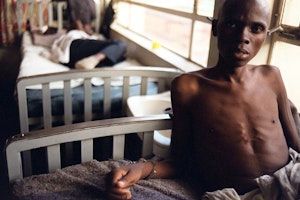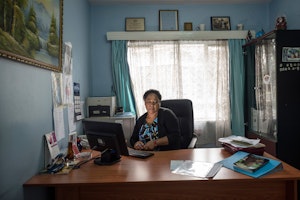In Botswana, a Victory for Women’s Health in Property Rights Case
By Priti Patel
In 2007 Edith Mmusi risked losing her family home in Botswana. Her father had died 60 years earlier and her two brothers, by then both deceased, had left the property a long time before. Over the previous two decades she and her sisters had renovated and expanded on the homestead through their own means. But now her half-brother’s son was challenging them for ownership citing a customary rule that denied women the opportunity to inherit family property.
The four sisters challenged this rule in the customary courts, arguing that it violated their right to equality under the Botswana Constitution. The case made its way to the High Court in Mmusi and Others v Ramantele and Another. On October 12, Judge Oagile Dingake found that the customary rule violated their constitutional right to equality. This decision—a major victory for women’s rights—is only the second ruling on women’s rights in Botswana.
The Mmusi judgment was most notable for unequivocally rejecting the Attorney-General’s argument that even though the law is discriminatory, it should stand because Botswana is not ready to embrace equality. The court ruled that culture can never be a valid rationale for trampling on fundamental constitutional rights. “The law [at issue] is biased against women,” it said, explaining that “it cannot be an acceptable justification to say it is cultural to discriminate against women … Such an approach would … amount to the most glaring betrayal of the express provisions of the Constitution and the values it represents.” The court found that the rule “has no place in a democratic society that subscribes to the supremacy of the Constitution—a Constitution that entrenches the right to equality.”
In defending the customary rule, the Attorney-General relied on a prior Court of Appeal decision that upheld the criminalization of sodomy under Botswana’s penal code. In that case, Kanane v S, the court found that Botswana society was not ready to embrace homosexuality and thus the law was permitted to stand. But in Mmusi the Court “reject[ed] outright any suggestion…that the court must take into account the mood of society in determining whether there is a violation of constitutional rights as this undermines the very purpose for which the courts were established.” The Mmusi Court also fully canvassed decisions from other countries including the United States, the United Kingdom, Ghana, Tanzania, India and South Africa in reaching its decision, noting the high number of countries which have struck down discriminatory customary laws.
The Mmusi decision is now one of a series women’s rights cases in Southern Africa that have been decided or litigated in recent months. In July, the Namibian High Court held that the rights of three HIV-positive women were violated when they were forcibly sterilized in public hospitals. And the Lesotho Constitutional Court is currently deliberating whether to strike down an act which denies women the right to succeed to chieftainship. Now, the decision in Mmusi is a standard for other countries in the region that are confronting similar challenges to domestic laws which discriminate against women, especially with respect to property, inheritance and succession.
These legal challenges not only offer the possibility of equality for women within the region, but also, if successful, can have a positive impact in the response to HIV. Just last year the Global Commission on HIV and the Law, a commission created by UNAIDS and the United Nations Development Programme, found that an appropriate, rights-respecting legal environment can reduce the number of people infected with HIV by almost 1 million by 2030. In order to foster this environment, the Commission recommended that all countries reform property and inheritance laws to ensure that women and men have equal access. Without property rights, women are more likely to fall into poverty, and less likely to protect themselves from HIV infection or to seek treatment.
The Mmusi decision took an important step toward ensuring equality for women in Botswana, better enabling them to protect themselves against HIV.
Priti Patel is the deputy director and HIV program manager at the Southern African Litigation Centre, a grantee of the Open Society Foundations.


